In 1978, a naturopathic doctor told 48-year-old Barbara Loden that her cancer may have developed because she hadn’t cried enough. He advised her to find some ways to release that emotional pain from her body; the actress-turned-director looked to deepening her artistic practice for consolation. Ballet barre and piano supplemented chemotherapy while she worked with grit to continue her creative and worldly lives. Seven years prior to the diagnosis of the disease that would ultimately end her life, she had debuted her first and last directorial feature, 1970’s WANDA, also written by and starring her. An intimate verité style film about a classic loser, WANDA was inspired by a newspaper article Loden had found years earlier describing a woman who’d gotten tied up in a failed bank robbery and actually thanked the judge for giving her 20 years in prison. Loden’s husband, director Elia Kazan, described this film (and those she anticipated making before her unprecedented death) as “devoted to the neglected side of American life.” It seems a perfect metaphor that Loden’s emotional life went untold by her physiological response patterns, just as rural America’s suffering often goes mistold or wholly ignored by art and media.
The impulse to make WANDA came from Loden’s lived experience. She often described leaving her own “hillbilly town” in North Carolina at 17 with aspirations of becoming an artist. In New York City, stints as a model and copacabana dancer eventually evolved into acting roles for film and theatre. Though she was uneducated and without experience, she won the hearts of writers and directors with her sincere vulnerability and natural talent. Her relationships are likely to credit for her ability to find any real success in the art world, not because she was untalented, but because she was originally unconnected to the industry. Her husband’s success vouched for her own as an actress, and he aided her in understanding the nuances of the industry she’d grown up so distant from. Despite Kazan’s influence, Barbara Loden’s real legacy lies in WANDA, which is hers and hers alone. In it, she inhabits the eponymous character she wrote with such little distance that it’s natural to assume Wanda must be some parallel universe, could-have-been version of herself: a Loden under different circumstances, stranded in the stark cultural desert of a coal mining town in Pennsylvania. No education and no power, a dim floating point of listless individualism spawned by American poverty.
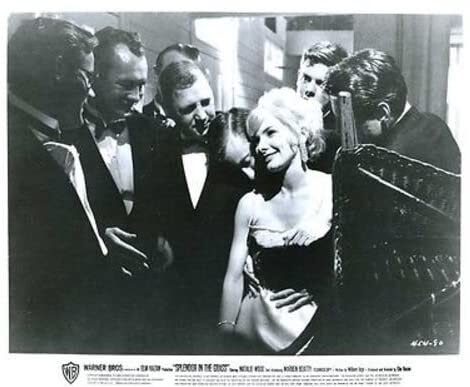
Loden in Elia Kazan’s SPLENDOR IN THE GRASS (1961).
I have an intense sympathy for the condition of rural America. The mysterious vastness which houses small towns, each with their stories of unique darkness and idiosyncratic joy. Its solitude and stillness are at once bleak, deeply charming, and even romantic. My family hails from Belen, New Mexico (population 7,000) where I spent childhood summers falling in love with it. The stories of Belen are the lore of my lineage, their range stretching to each valued community member drenched in their own way of existing there. My grandmother once threw a neighborhood party where, after a few drinks, a friend of hers allowed a full-sized horse to wander into the house—a prank which took hours of labor from the entire party to undo. When I included this famous horse anecdote as a plot point in a short story I wrote for a class at my Southern California university, my professor and peers critiqued the “fictional narrative,” saying something like that “could never happen”… Well, they’d clearly never been to Belen. I felt both embarrassed and amused over a sudden realization that a cultural distance existed between myself and my classmates. I felt the same way when I lost my shit weeping watching I, TONYA with a friend who’d grown up in a major city; she simply couldn’t get emotional about trailer park culture—understandable! These peers, almost all American, had never experienced this America. Empty, strange, beautiful, self-mutilating. I couldn’t find the vocabulary to adequately describe the mundane absurdity of my grandmother’s story, or what it revealed about the spirit of the small town in New Mexico I loved so dearly. As Loden said of WANDA, it’s hard to tell a simple story.
We meet Wanda in poor spirits: facedown on the couch, baby crying, light relentless through the blinds. It’s easy to slide into WANDA and identify with its heroine; I absorbed the film as if it was the next scene in my own parallel universe life. An America I knew so well but could never relay in words was suddenly alive here—dim, beautiful, and aging, she seems to hover uselessly outside of her own life. She leaves her husband and children easily, wanders from man to man to ice cream shop to movie theatre, eventually becoming dependent on a petty criminal, Mr. Dennis, whose big bank-robbing scheme ultimately fails. Her story then is both tragic and unromantic in its anticlimax. Though Mr. Dennis is cold, authoritarian, and habitually humiliates her, Wanda values him for his capacity and willingness to give her any sort of attention at all.
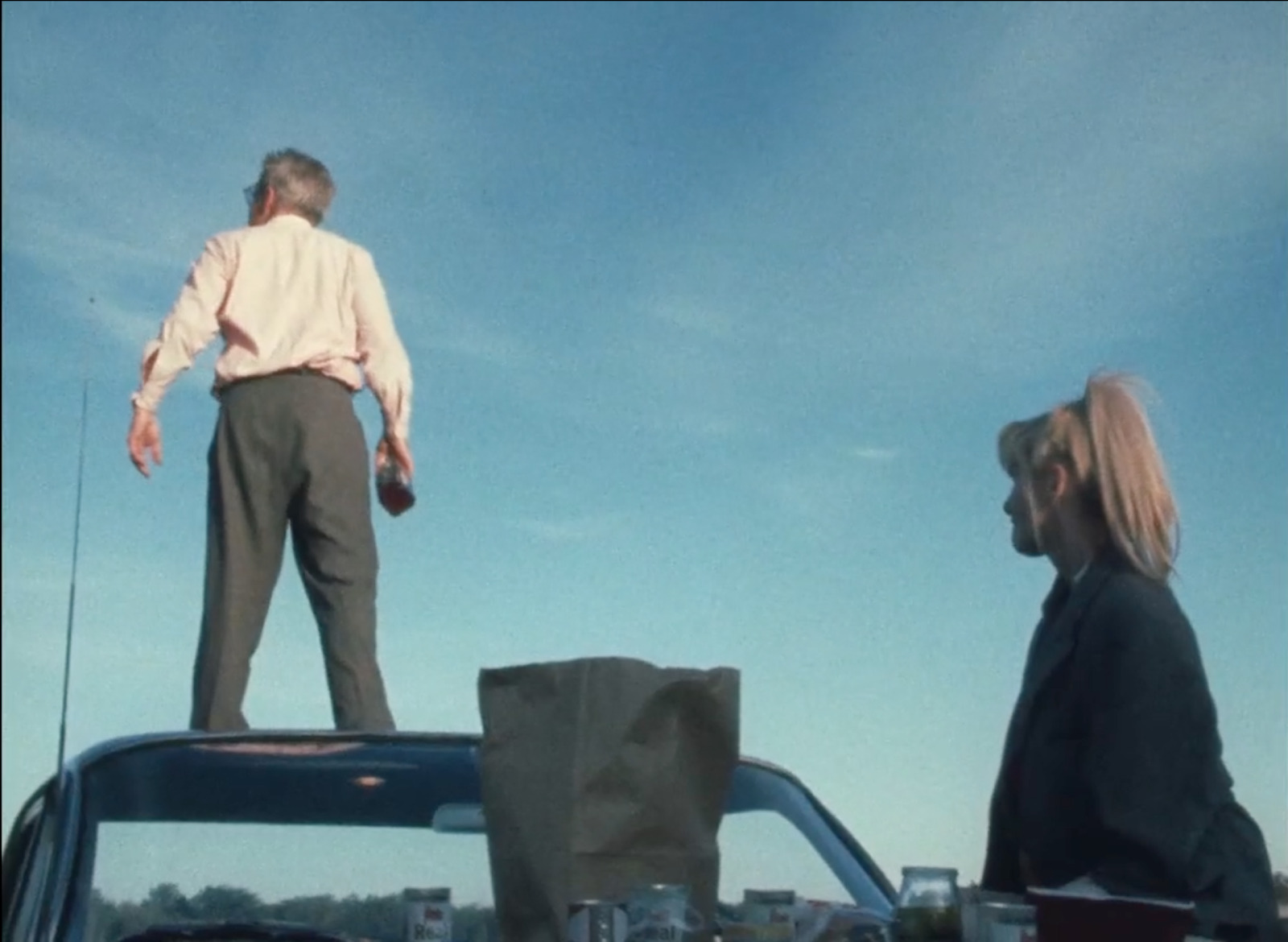
Wanda gazes up as Mr. Dennis yells aimlessly at a passing plane.
In a sense, not much of anything happens to Wanda, not much of anything seems like it ever will—that’s her tragedy. By the end of the film, she’s narrowly escaped sexual assault at the hands of a different man and wandered into a backwoods roadhouse, where she is greeted by strangers with music, cigarettes, and provisions. A distinct ennui wafts from her as she’s jostled between men and women drinking pitchers of beer and enjoying a lively band. She weakly drags a smoke, the people around her absorbed in the warm fantasy of each other’s company. They’re in fact so distracted by each other that a horse could easily wander in unnoticed. Sadness used up, Wanda returns to herself by way of the company of ordinary people. This is when I typically weep at the melancholic joyfulness of the whole affair—the profound kindness of nihilistic neighbors infused with a bitter, but victorious acceptance of a life that, though stunted, is all her own. This is the mundane aspect of rural life that has taught me how to feel completeness out of the ordinary so deeply that the authentic hedonism and bitter irreverence it fills me with feels a bit like church. WANDA is vivid and avant-garde; empty and full all at once. Perhaps this is the only way to communicate a neglected culture that creates such a complex ache.
Loden won Best Foreign Film at the Venice Film Festival, where WANDA was interpreted as a political statement on the existential nature of American life. Second wave feminists and American critics originally loathed the film, calling Wanda stupid, a travesty on the part of feminine progress—“Nobody likes a victim.” In a statement, Loden brushed them off, labeling them as “just jealous,” a response I truly adore. Loden refuted every critical claim, and her defense of common people lights up in her refusal to confirm any political or intellectual statements assigned to her film.
WANDA is a film about people who don’t know why they exist. Whether that feeling emerges from political circumstances is not irrelevant necessarily, but instead distracting from the truth of the feeling. It seems to me second wave feminism was high time a woman should be praised for articulating the pain of being a wandering, pure loser, just like J.D. Salinger had. Though Loden’s untimely death kept her from making another film, we should feel lucky she made WANDA. Its sincere desire to unveil reality is a gift to the kind of life it represents. WANDA is a film describing the type of woman who by no fault of her own would thank the judge for sending her to prison, the husband for manipulating her, and the criminal for forcing her complicity, just so she’d finally know what to do. For that, I feel sincere gratitude to the brilliant humility of Barbara Loden.



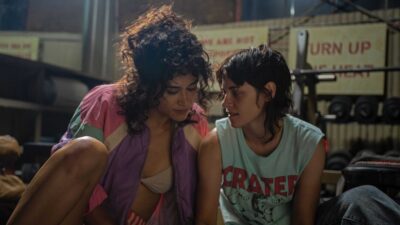






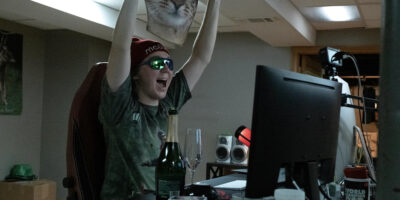


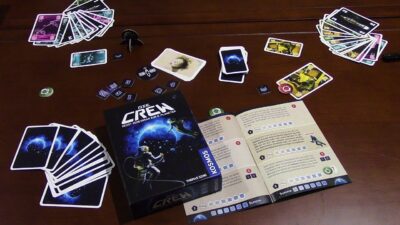
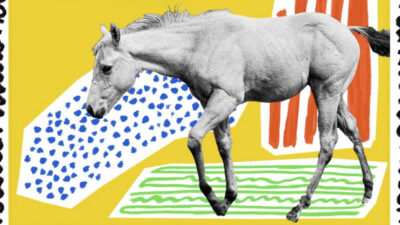
Comments